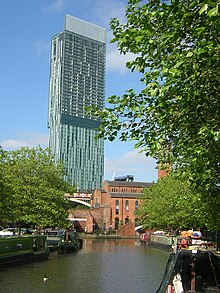 The Beetham Tower, one of the largest buildings outside of London | |
| Statistics | |
|---|---|
| Population | 568,996 (2022)[1] |
| GDP | £33.6 billion (2022)[2] |
GDP per capita | £59,136 (2022)[2] |
Labour force | 288,600 / 71.4% in employment (Jan–Dec 2023)[a][3] |
Labour force by occupation | List
|
| Unemployment | 15,500 / 5.1% (Jan–Dec 2023)[c][3] |
Average gross salary | £634.80 per week (2023)[d][3] |
| External | |
| Exports | £6.3 billion (2021)[e][4] |
Export goods | £1.6 billion (2021)[f][4] |
| Imports | £5.6 billion (2021)[e][4] |
Import goods | £3.4 billion (2021)[f][4] |
The economy of Manchester is among the largest in England. Manchester is a city and metropolitan borough of Greater Manchester. It lies within the United Kingdom's second-most populous urban area, with a population of 2.55 million.[5] Manchester's commercial centre is in Manchester city centre, focused on Spinningfields, Mosley Street, Deansgate, King Street and Piccadilly Gardens.[6]
Historically, the world's first industrialised city,[7] the region was once in economic and population decline.[8] In 2012 Greater Manchester South, which includes the cities of Manchester and Salford and three other metropolitan boroughs, was the largest NUTS3 area outside London in economic terms, and growth was 3.8% vs the Core Cities average of 2%.[9] Between 2002 and 2012 Greater Manchester South grew 45% vs. national growth of 44%.[10] Meanwhile, the 2011 census also showed that Manchester was the fastest growing city in the UK in terms of population.[11][12] Manchester is also a city of contrast, where some of the UK's most deprived and most affluent neighbourhoods can be found.[13][14] According to the 2010 Indices of Multiple Deprivation Manchester is the 4th most deprived local authority in England.[15] On the other hand, Greater Manchester is home to more multi-millionaires than anywhere outside London, with the City of Manchester taking up most of the tally.[16] In 2013 Manchester was ranked 6th in the UK for quality of life, according to a rating of the UK's 12 largest cities.[17]
Manchester is considered to be a 'beta -' global city, rated as the second most globally influential city in the UK after London with Edinburgh third, Belfast fourth and Glasgow fifth.[18] The region is now an economic knowledge-led centre, with research and enterprise clustered around the University of Manchester,[19] where research ranked as the third most powerful in the UK behind Cambridge and Oxford.[20] Typical industry areas include: digital and creative, financial, legal and business services, biotechnology, advanced manufacturing, environmental technologies, tourism, global sports brands, media and real estate. The city is also a key location for many foreign owned companies and headquarters, and almost half of the Northwest's Top 500 businesses.[21] Manchester City Council also plays a uniquely active role in business, where it owns key infrastructures such as a 35.5% stake in Manchester Airports Group, which owns other UK airports such as London Stansted Airport, and is the owner of the City of Manchester Stadium, home to one of the world's highest earning football clubs.[22]
- ^ "Mid-Year Population Estimates, UK, June 2022". Office for National Statistics. 26 March 2024. Retrieved 3 May 2024.
- ^ a b "Regional gross domestic product: local authorities". Office for National Statistics. 24 April 2024. Retrieved 22 May 2024.
- ^ a b c d "Labour Market Profile - Manchester". Nomis. Office for National Statistics. Retrieved 22 May 2024.
- ^ a b c d Tuck, Helen (28 June 2023). "International trade in UK nations, regions and cities: 2021". Office for National Statistics. Retrieved 24 December 2023.
- ^ "2011 Census – Built-up areas". ONS. Retrieved 1 July 2013.
- ^ Hatmaker, Julia (12 May 2023). "UKREiiF | Why Manchester is the UK's leading city for investment". Place North West. Retrieved 1 January 2024.
- ^ Kidd, Alan (2006). Manchester: a History. Lancaster: Carnegie Publishing. ISBN 1-85936-128-5.
• Frangopulo, Nicholas (1977). Tradition in Action: the historical evolution of the Greater Manchester County. Wakefield: EP Publishing. ISBN 0-7158-1203-3.
• "Manchester United in Celebration of City". European Structural Funding. 2002. Archived from the original on 7 December 2006. Retrieved 18 December 2006. - ^ "Manchester: a phoenix rises". KPMG.[permanent dead link]
- ^ "ONS Regional GVA - December 2013". Retrieved 19 December 2013.
- ^ Cite error: The named reference
Leeds Economywas invoked but never defined (see the help page). - ^ "Census 2011: Five lesser-spotted things in the data". BBC News. 17 July 2012.
- ^ "[ARCHIVED CONTENT] Census result shows increase in population of London as it tops 8 million - ONS".
- ^ "Introducing South Manchester | South Manchester: Living in the area | Manchester City Council". Archived from the original on 15 July 2014. Retrieved 9 August 2014.
- ^ "Wealth hotspots 'outside London'". BBC News. 7 July 2004.
- ^ "1871689.xls" (XLS). UK Government. 2010. Archived from the original on 23 April 2022. Retrieved 3 March 2023.
- ^ "Boom city Manchester has more super-rich than anywhere outside London". 17 September 2012.
- ^ "Bristol is 'best city to live in the UK'". www.telegraph.co.uk. Retrieved 29 June 2023.
- ^ https://www.lboro.ac.uk/gawc/world2020t.html , GaWC study
- ^ "Vastgoedadviseurs & professionals | JLL Nederland" (PDF).
- ^ "Rankings and reputation | Master's at the University of Manchester".
- ^ http://www.manchester.gov.uk/info/200079/regeneration/2482/manchester_a_great_city_to_do_business Archived 2013-12-26 at the Wayback Machine, Manchester.gov.uk.
- ^ Balfe, Richard. "Deloitte Football Money League 2012" (PDF). Deloitte. Archived from the original (PDF) on 2 February 2013. Retrieved 28 January 2013.
Cite error: There are <ref group=lower-alpha> tags or {{efn}} templates on this page, but the references will not show without a {{reflist|group=lower-alpha}} template or {{notelist}} template (see the help page).